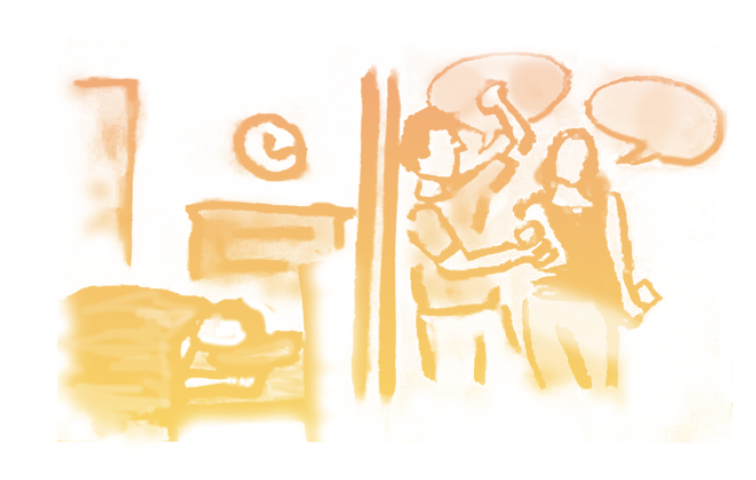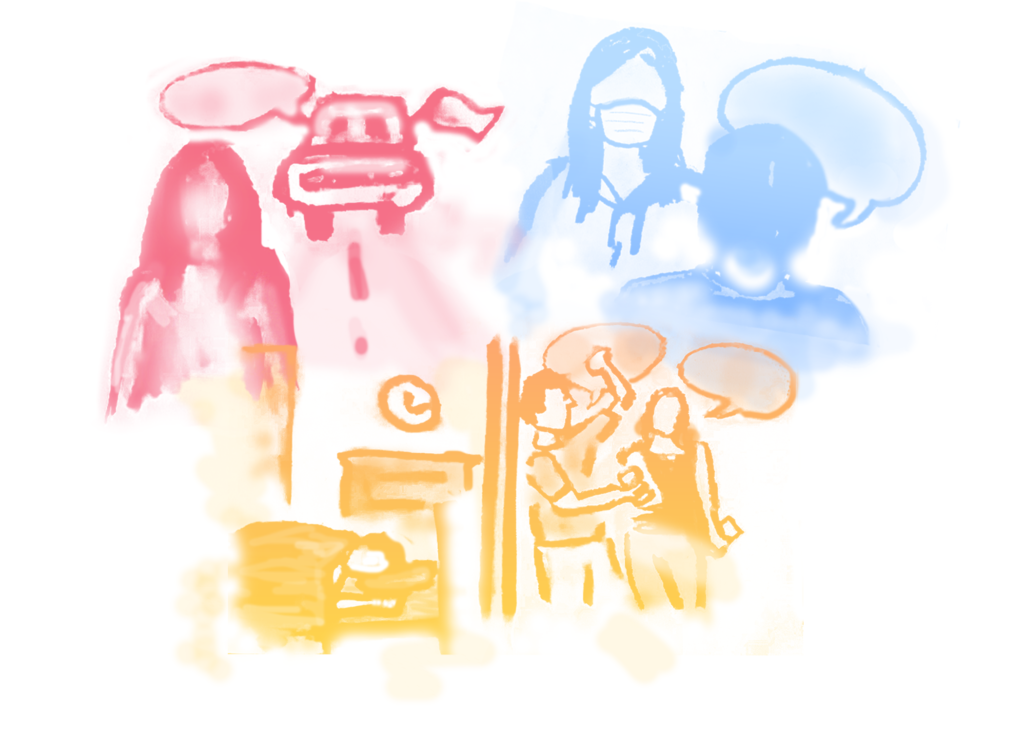“Don’t be surprised”: Grinnell’s East Asian students reflect on racism and xenophobia during COVID-19
April 28, 2020
By Lucia Cheng
chengluc@grinnell.edu
Many students can recall the chaos during the week of March 10 – the packing of boxes, the frantic goodbyes to friends, the rapid changes in policies as the College shut down campus due to COVID-19 – but some students had the additional burden of increasingly overt discrimination against East Asians, adding yet another layer of uncertainty to an already uncertain future.
“Some of my friends who are from China are from the same city as me, Nanjing,” said Chinese Student Association President Zhenzhong [Jack] Xing ’23. “They told me that when they were sleeping in a room, they heard other people yelling “Fuck Chinese” next door and then going to a party.”

The night before, March 11, someone had written “FUCK WUHAN SAVE USA” on a whiteboard in the residence halls outside a student’s room. Wuhan, a city in Central China, was the site of the first outbreak of the novel coronavirus, COVID-19, which has now been detected in over 175 countries. In response, xenophobia and racism towards East Asian communities worldwide has spiked dramatically, fueled by such prominent individuals as U.S. President Donald Trump.
When Kat St. Martin-Norburg ’23 woke up to the message on her whiteboard in the morning, at first it didn’t register.
“My first instinct wasn’t naturally one of anger,” said St. Martin-Norburg. “My anger developed later. It was kind of like amusement – I was like, ‘Huh, so there are some closeted racists living on my floor, and they’re so ignorant that they don’t even know that I’m not even from Wuhan.’”
Having been adopted and raised by a white family, she found this especially ironic.
It was only after St. Martin-Norburg posted about the writing in the Facebook group Grinnell Thumbs Down that she realized the deeper context behind the incident. She was surprised at what the act implied, that xenophobia could even occur at a place like Grinnell College, which has a reputation for social justice. Growing up, St. Martin-Norburg had already had to confront the assumptions people made about her race and culture, finding ways to talk about her identity to divulge just enough detail for others to understand that her story is separate from their expectations.
“For me personally, it kind of hurts a little more because I’ve spent my whole life here being told, ‘Oh, you don’t belong here,’” said St. Martin-Norburg, “and trying to prove that I do.”
Other East Asian students recalled an incident in which a person in a red truck with Trump banners yelled at a student just off campus and disputes over Facebook, including racist and xenophobic memes.

In response to the mounting number of incidents, the Chinese Student Association (CSA) and the Office of Diversity and Inclusion and the Office of Intercultural Affairs published written statements warning against bias-related incidents on March 12. No information has been provided as to further investigation of the incidents.
“Some senior students said that it’s not the first time since things like that have happened on campus. It just got more severe and [pointed] outwards,” said Xing.
The students interviewed by The S&B said that such incidents are indicative of longstanding issues of racism and xenophobia at Grinnell which COVID-19 has just made more overt.
“They love to eat our food, they love to have all these cultural differences, they love our cultural accessories. They love to have these experiences that make [themselves] more interesting. But when it comes to like actual issues, they would still fall back on us being foreign and being xenophobic towards us,” said Cat Ton ’22.
That surface-level appreciation of diversity is not the same as explicit acknowledgement of different perspectives.
“I get the impression that some people would think that I’m biased, or to put it in more extreme terms, I’ve been brainwashed by the education I received back home,” said Yilan Dong ’21. “I’ve been called out by a person who said I lack logical and critical thinking because my viewpoint is different from theirs.”
International students of color must choose when to speak up, or when to let micro and macroaggressions go and have their experiences and identity discounted or marginalized.
Dong recalls how her economics professor attempted to reassure students about the impending virus as the crisis progressed. The focus of the class session was on reducing the stress of attendance. After a few questions, Dong recalled how a student raised their hand and instead brought the conversation to the negative externalities of the Chinese government, disregarding the feelings of those coming to terms with the gravity of COVID-19.
“It’s kind of inappropriate to bring up that subject when the professor is trying to reassure us of how he would be flexible, given the things that are happening,” said Dong, “Being a Chinese student in that class, knowing the situation all alone, worrying about family and friends, and hearing other students saying that basically this is the fault of our government … It made me uncomfortable.”
Asian students would rather not be reduced to a mere bullet point in response to someone else’s question. Because while others have the luxury of taking themselves out of the equation and moving on with their lives, for international students, the situation can get much more personal.
At first, Miho Tatsuki ’20 did not believe such blatantly racist acts would occur towards her individually, at least not to the point of a physical standoff. Out of health precautions, she decided to wear a facemask to fly out of O’Hare International Airport. However, the mask was not enough of a deterrent to stop a person from walking up to her and coughing directly in her face.

In the span of those few minutes, xenophobia went from articles in the news to something that was directly threatening her.
“I feel like it’s hard for people who didn’t experience that to understand the impact it has. It’s not just the fact that a person coughed at you. It’s more like an accumulation of a lot of things that are happening around the xenophobic atmosphere in the states,” said Tatsuki.
Even then, Tatsuki worried that she may have been overreacting, caring too much about a small thing, despite living through similar instances in her past.
“I’ve experienced overt racism in high school, going to school in the states, but I didn’t expect to face that again. I think it’s very childish,” said Tatsuki. To her, the disrespect she faced on both accounts seems to come from a place of ignorance.
On Grinnell’s campus, the students interviewed recalled a general apathy of domestic students to the challenges faced by international students in their everyday lives, as there are many experiences with which domestic students do not have to contend.
One example is getting student and work visas in order to attend Grinnell, a process during which individuals are viewed as “intending immigrants” until they can convince the consular officer otherwise.
A common liberal arts refrain is that your major does not heavily impact your future. But international students have to choose their major differently than domestic students. Their jobs must be related to their majors in order to obtain a sponsorship to stay in the U.S. The sponsorship process itself costs thousands of dollars, which means an international student must find a large company willing to pay that amount.
“Not only do you have to prove to a company that you are competent,” said Ton, “You also have to prove to them that you are worth that money.” Ton said that domestic students are often not aware of this reality. Once, she overheard someone at her table in the Dining Hall complaining about the invasiveness of UK immigration policy, which only consists of a single form, a complaint Ton characterized as “just being oblivious and thinking that filling out this one form is very intrusive.” In an ideal world, she wishes that domestic students would seek out what it means to live in other countries, leaving international students free from the burden of ignorance.
“There’s a lot of work needs to be done,” said Ton. “But if international students don’t do it, then who’s going to?”
Until then, students agreed, microaggressions and acts of bigotry will carry on perpetuating racism and xenophobia within the culture of the College.
“Knowing that it’s just a fraction of a big issue,” said Tatsuki, “I feel really powerless.”
Coming from Tatsuki, who is a fourth year, and hearing the same sentiment expressed by Xing, a first year, the resignation was almost palpable.
“A lot of Vietnamese students told me that you should expect this kind of thing to happen,” said Xing, “So don’t be surprised.”













































